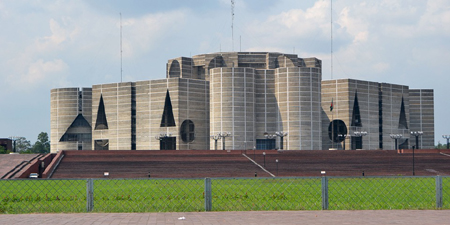Bangladesh parliament passes draconian Digital Security Act
JournalismPakistan.com | Published: 20 September 2018
Join our WhatsApp channel
The Bangladesh Parliament approved the Digital Security Act, which critics argue undermines freedom of expression. Provisions within the Act could severely impact independent journalism.Summary
The draconian Digital Security Bill 2018 has passed the Bangladesh Parliament with provisions curtailing the freedom of expression and independent journalism.
The International Federation of Journalists (IFJ) joins the Bangladesh Manobadhikar Sangbadik Forum (BMSF) in expressing serious concerns over the legislation which has scope to harass media and journalists.
On September 19, Telecommunication and Information Communication Minister Mustafa Jabbar placed the bill for immediate passage and the 350-member parliament passed the bill by voice votes with only 11 lawmakers opposing the bill. The formulation of the law was initiated in 2015 with the cabinet approving the draft on January 29, 2018, and placing in the House on April 9, 2018.
The Editors’ Council on September 16 in a statement rejected the bill stating that Sections 8, 21, 25, 28, 29, 31, 32 and 43 of the bill posed serious threats to freedom of expression and media.
Section 8 includes provisions about blocking or removing any information in the digital media over any content deemed hampering harmony, public order, or creating communal hatred, among other things. Section 21 states anyone ‘spreading negative propaganda against the Liberation War or the Father of the Nation, National Anthem and national flag’ using digital devices or instigating to do so would be punished with imprisonment for up to life term.
According to Section 25, a person may be jailed up to five years for ‘deliberately publishing or broadcast on a website something attacking or intimidating or which can make someone feel disgruntled or knowingly publishing or broadcasting false or distorted information. Section 28 states if anyone hurts religious sentiments, they may face jail for up to 10 years. Section 29 states a person may face up to three years if they defame someone as stipulated in section 499 of the Penal Code through a website. Section 31 states a person may face up to seven years in prison if they are found to have deliberately published or broadcast something on a website which can spread hatred and create enmity.
As per Section 32, if a person commits any crime or assists anyone in committing crimes under colonial-era Official Secrets Act, 1923, through the electronic medium, he or she may face a maximum 14 years in jail. Section 43 allows a police officer to search or arrest anyone without any arrest warrant.
Section 21, 28, 31 and 32 are classified as non-bailable offences.
The IFJ said: “The gross misuse of laws in Bangladesh, such as Section 57 of the ICT Act, to curtail freedom of expression and stifle critical voices raises serious concerns about these new laws which only strengthen the government’s power to control and suppress the media. The problematic provisions including Sections 8, 21, 25, 28, 29, 31, 32 and 43 raise serious concerns about the freedom of the press, with arbitrary provisions with scope for state agencies to harass and intimidation journalists. The IFJ calls for the law to be immediately amended to guarantee press freedom.” – IFJ media release
KEY POINTS:
- Parliament passed the Digital Security Act by voice vote with minimal opposition.
- Sections of the Act pose threats to freedom of expression and could criminalize various forms of media content.
- International organizations have raised alarms over the potential for misuse against journalists.
- Provisions in the Act include severe penalties for defamation and religious sentiment violations.
- The law strengthens government control over media and diminishes press freedom.

























